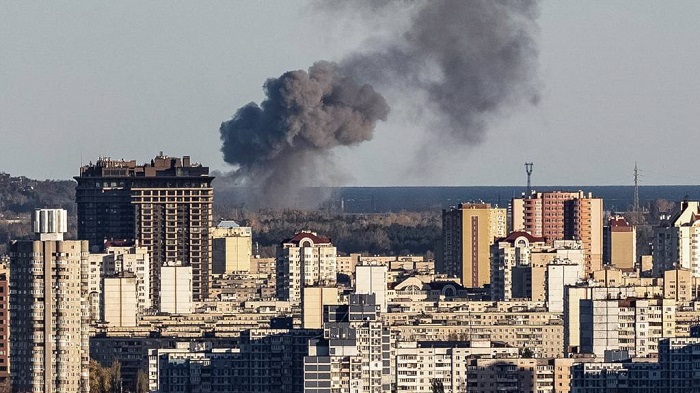Scores injured in Kyiv as Russian missiles strike the city
Several individuals suffered injuries in a series of missile strikes on the Ukrainian capital, Kyiv, overnight, according to official reports.
The attacks resulted in 53 people, including six children, sustaining injuries, and there were reports of damage to kindergarten and hospital structures from debris. Authorities asserted that 10 Russian ballistic missiles were successfully intercepted.
The missile strikes occurred following President Volodymyr Zelensky’s departure from the US, where he faced resistance from hesitant Republicans in Congress while appealing for increased military assistance for Ukraine.
On Thursday, EU leaders are scheduled to discuss the possibility of providing additional aid to Ukraine. European Commission President Ursula von der Leyen stressed the importance of furnishing Ukraine with the necessary resources to enhance its strength.
In response to the Wednesday night attack, President Zelensky vowed retaliation and condemned Russia for its actions.
He expressed his criticism, saying, “Once again, Russia has shown its malicious intent by launching missiles at night, targeting residential areas, kindergartens, and energy facilities in the winter,” as conveyed in his post on X.
The assault on Kyiv on Wednesday began around 03:00 (01:00 GMT), constituting the second ballistic missile strike on the capital within the week. Although Russian drones had targeted Kyiv in the preceding weeks, the city had not experienced missile attacks for 79 days until the previous Friday.
Ukraine’s air force claimed the successful interception of all 10 targets approaching the city using anti-aircraft missiles. The aftermath included shattered windows in residential apartment blocks and damage to parked cars. The ballistic missiles triggered loud explosions, followed by the activation of air raid sirens.
Russia resumed the use of cruise missiles last week after a hiatus of 79 days, according to officials.
Mykhailo Podolyak, an adviser to President Volodymyr Zelensky, conveyed on X (formerly known as Twitter) that ballistic missiles were employed precisely to eliminate any chance for people to seek refuge in bomb shelters.
The projectiles identified by Ukraine’s Armed Forces General Staff were Iskander-M ballistic missiles and S-400s, which are extremely fast missiles designed for air defense but have also been utilized against ground targets.
A man named Oleksander recounted to the BBC that the windows in his apartment were shattered in the middle of the night. He became emotional as he remembered witnessing his neighbors and their children being taken away by ambulance.
Simultaneously, Ukraine’s largest mobile network operator expressed its hope to resume operations on Wednesday following what seemed to be the most significant cyberattack since Russia initiated its full-scale invasion in February 2022.
The cyberattack on Kyivstar on Tuesday, which serves over half of Ukraine’s mobile subscribers, has jeopardized the air raid alert system for millions of people. The responsibility for this latest cyberattack has been claimed by a Russian hacking group, known for targeting internet providers and Ukrainian websites earlier this year.
The port city of Odesa also experienced an attack by drones overnight, lasting “several hours,” as reported by a regional military chief. The incident resulted in two reported injuries and damage to civil infrastructure.
Ukrainian President’s unannounced visit to Norway on Wednesday was aimed at discussing support for his country’s defense efforts.
This visit followed his trip to the US, where he made a final attempt to secure new military aid from Congress before the currently approved amount is depleted.
However, it appears that the expectations of President Zelensky leveraging his persuasive abilities in Washington DC to unlock additional military aid have not materialized.
President Joe Biden issued a warning to Republicans, cautioning them that their failure to approve additional military aid to Ukraine would be akin to giving Russia a “Christmas gift.”
Following discussions with Biden, President Zelensky stated that they had agreed to collaborate on increasing the number of air defense systems in Ukraine.
Zelensky emphasized the critical nature of this decision, highlighting that each additional system and missile plays a vital role in safeguarding the lives of Ukrainians and their cities.
Zelensky’s advocacy for aid took place in anticipation of a summit of European leaders, where Ukraine aspires to receive a start date for talks regarding its potential accession to the European Union.
Hungarian Prime Minister Viktor Orban has restated his stance against the European Union initiating accession talks. Orban expressed his belief that the EU is on the verge of a significant error, asserting, “The EU is preparing to make a terrible mistake, and we must prevent that even if 26 members want to make the mistake,” in comments to the local website Mandiner.
Orban emphasized that while supporting Ukraine with a geostrategic signal is essential, it should not translate into EU membership. Hungary has consistently clashed with EU partners regarding Russia’s invasion of Ukraine, adopting a less stringent stance on sanctions and vetoing a deal last December that would have granted Ukraine €18bn (£15.5bn) in 2023.
In an attempt to influence Orban to ease his objections to aiding Ukraine, the EU’s executive is anticipated to unlock €10bn in funding for Hungary on Wednesday, a move criticized by some as a strategic maneuver.
EU Commission President Ursula von der Leyen conveyed to the European Parliament that Ukraine’s struggle extends beyond resisting the invader; it represents a fight for Europe. Von der Leyen emphasized that Ukraine’s ultimate triumph lies in joining the European family, and in achieving this goal, the EU has a pivotal role to fulfill.
In contrast, Hungarian Prime Minister Orban, speaking to the Hungarian parliament on Wednesday, asserted that the prospect of Ukraine becoming an EU member is fundamentally misaligned with Hungary’s national interests.
